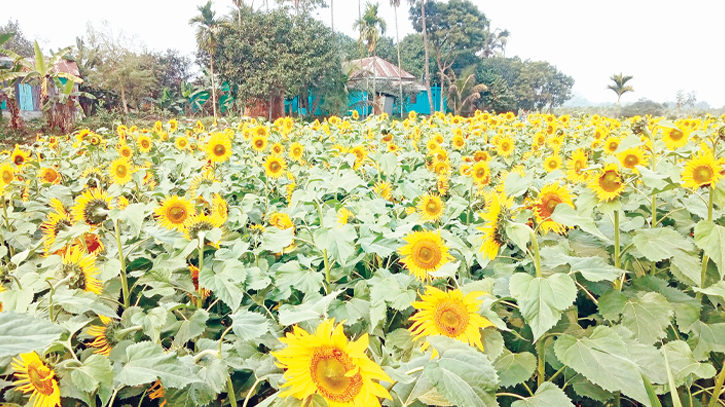
Photo : Messenger
Farmers in Manikganj are increasingly drawn to sunflower cultivation due to favorable soil and climate conditions.
The potential for substantial profit with minimal time and financial investment has piqued the interest of sunflower growers in the region, resulting in fields adorned with blooming sunflowers.
The current weather conditions have been conducive, raising expectations for a bountiful sunflower harvest. Sources from the Upazila Agriculture office indicate that the low production costs and encouragement from officials are driving farmers to prefer sunflower cultivation over other oil crops.
In response to the shortage of edible oil, farmers in Manikganj, alongside mustard cultivation, are now finding a keen interest in sunflower cultivation. District Agriculture Department officials believe that sunflower cultivation is more viable due to lower production costs and the potential for cost-effective growth. The current season has witnessed the cultivation of 32 hectares of sunflower fruit across 7 upazilas in the district, as reported by the Manikganj District Agricultural Extension Directorate.
Deputy Assistant Agriculture Officer Dulal Chandra of Singair Upazila expressed enthusiasm about the widespread sunflower cultivation and the growing interest among farmers, foreseeing an increase in arable land dedicated to sunflower cultivation in the future. Farmers anticipate harvesting sunflower seeds within 90 to 105 days of cultivation, with an expected yield of six to six and a half maunds of sunflower seeds per bigha of land. Each maund of seeds can yield 18 kg of oil, which can be sold in the market at Tk 280 per kg. Additionally, sunflower by-products such as khail can be utilized as fish food and wood fuel, leaving no part of the plant to waste.
Mofazzal Hossain, a farmer from Jaimontap village, emphasized the cost-effectiveness of sunflower cultivation compared to other crops, expressing satisfaction with his own yield and anticipating good profits, especially with favorable weather. Zahir Uddin, a farmer from Balla village, highlighted the importance of sunflower cultivation in meeting the demand for edible oil, emphasizing the multifaceted utility of sunflower plants.
Farmer Habibur Rahman underscored the financial advantages of sunflower cultivation over traditional paddy farming, citing the potential for higher profits and the multifunctional use of sunflower products. He emphasized the significant oil production potential, with 7 to 10 maunds of seed yielding 140 to 200 liters of oil per bigha of land, fetching a minimum market price of Tk 250 per liter.
Deputy Director Abu Md Enayet Ullah of the Manikganj District Agricultural Extension Department observes a notable shift in agricultural practices, with farmers increasingly gravitating towards sunflower cultivation to meet the country's edible oil demand. He attributes this trend to the shorter cultivation period and reduced financial investment required for sunflower farming.
The growing interest in sunflower cultivation among Manikganj farmers is indicative of a significant shift in agricultural practices, with the potential to address the region's edible oil demands while offering a profitable and sustainable alternative to traditional crops.
Messenger/tareq








